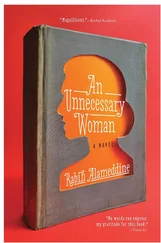“Happy anniversary, Saniya.” Amal, always cheerful in the morning, was probably in the office already. “Is Father out already?”
“Yes, of course. It’s twelve minutes past eight-twenty. The schedule must be kept.”
By the time she finished her coffee, every family member would have called to wish her a happy anniversary and congratulate her on the safe arrival of her son. She was surprised to receive a phone call from her other stepdaughter, Sarah, from America. Sarah was not calling about Ramzi — it seemed those living abroad did not view international travel as an event worthy of a congratulatory call — she simply wanted to wish her a happy anniversary. Somewhat perturbed, Saniya asked if she needed money. Not at all, she was just calling because of the occasion.
She found herself considering what she should wear, how she should appear to her son on his first day back in over a year. What impression should she impart? What attitude did she want to reveal? In fall, on a rainy day like today, she always wore trousers, shirt, and a sweater, comfort and warmth over wide hips. She hesitated, contemplated a designer suit.
When Ramzi left for the United States, leaving her alone with her husband, a knell sounded. Her children had grown up, her husband was acting childishly, and she felt discombobulated and distraught. It was her expected retirement, but she was not prepared for it. It felt like a combination of stud farm and glue factory. She had to reinvent herself, change herself but not appearances. She adjusted to a new life without allowing the family to perceive threat. She picked the trousers, shirt, and a sweater. She would appear to be the kind of mother her son expected.
By ten o’clock, she was at the office, the Lebanese International Cable Company, LICC, her bastard baby. Although she was no longer needed for the day-to-day running of the company — Amal managed quite well on her own — she still managed to show up every weekday morning. People assumed it was Amal’s brainchild, and Saniya preferred it that way. She had thought of it when her husband bought a satellite dish.
When the war ended, everyone in Lebanon who could afford it installed a dish. The black and gray circles replaced the straight lines of antennas on Beirut’s rooftops. She wanted to “share” her good fortune with those not lucky enough to afford the price. Think of all the children who do not have the choice of good television because their parents are not hard working enough to be able to afford the five or ten thousand — dollar price, she told her husband. Don’t they deserve to see the same programs the rich children do? It won’t take too much of my time, she said. No, no, she said, I won’t be dealing with people. I’m not good with people. I’ll let Amal do that. I know, I know, I don’t have the technical understanding, but we have a satellite, and we have cables that run from it to our television, so it can’t be much harder to have cables running to other televisions. I’ll hire some engineer. Her husband finally relented, allowing her to dirty her hands, for the sake of the children. Although he did not know exactly how much she now made, since she was in charge of all finances, even his, her income the year before was ten times what he brought home.
When she looked back at how her business had started, Saniya was surprised by many things: the ease with which she made decisions, the decisiveness itself, the sheer audacity of her actions, her understanding of the logic of investment, and her lack of self-doubt. The company was set up easily. She opened an office, hired an engineer, and bought a huge dish from which they ran cables to any customer for only ten dollars a month. Her cables crisscrossed the city like dribbles in a Jackson Pollock painting. She had two hundred clients signed up within the first week. She recouped her investment in a little over six months. The problems arrived when men — it’s always men, men with money — began to copycat her idea. The solution arrived when she hired Tariq, the driver.
Tariq was a young Shi’ite from the south, a cousin of her husband’s driver. Her husband objected to him because of his connections to Hizballah, labeling him a fundamentalist because of his beard. Although Tariq was religious and had fought with Hizballah — could any teenager avoid the peer pressure of belonging to a murderous clan with a war raging on? — he was not the fanatic her husband assumed. If he looked with keener eyes, Mustapha would have noted the pitted skin. The short, unkempt beard was an attempt to cover up acne scars. Her husband saw a face that suggested the personality of a ruffian. Looking further, she saw the eyes of a boy desperate to please. She hired Tariq. He became her partner in crime.
When her competition began to take root — three different companies, owned by men with political connections — Saniya realized her only hope lay in dealing with them quickly and decisively utilizing the Lebanese Business Method. She asked Tariq and friends to hijack and destroy a truck carrying equipment belonging to one of her competitors. The owner of the company blamed the other two. The Lebanese cable war broke out. No one suspected her company or its principals — Amal, who was oblivious to what was going on, or her — for women knew nothing of “business” matters. Satellite dishes were riddled with bullets, generators blown to smithereens, cables cut. Her competitors left her alone for she had nothing to do with the battle. By the time the dust settled, the police got involved, and the newspapers ran their stories, her company was well entrenched. Other than the first blow, Saniya and Tariq remained uninvolved in the skirmishes with the exception of occasional tinkering with “independent” satellite dishes, impairing the reception, forcing their owners to subscribe to the only working cable company in Beirut, LICC.
She went into Amal’s office. Her stepdaughter was on the phone. Saniya sat down and waited for her to finish. She noted for the umpteenth time how sparsely the office was furnished. Functional, nothing decorative, no paintings, no pictures of children, no knickknacks or trinkets. Amal moved her arms in circles, suggesting the conversation was endless. Her fingers then returned to drumming on the desk.
Saniya had never seen her so happy. She wondered whether Amal’s flowering was due to finding out after all those years that she was a good businesswoman or that she was a desirable lover. It could have been a combination of both, but Saniya would have put money on the latter. After being in a dull marriage, Amal began to discover the pleasures of being desired. She assumed no one knew about the affairs. But she was not very discreet. So far, Saniya knew of at least three affairs, each with a successively more prominent man. Mustapha, Saniya’s husband, had indoctrinated his children to believe that passion was the antithesis of morality. Only when she discarded stifling morality did Amal find passion of any kind.
Amal, unlike her sister Sarah, was a conglomeration of contemporary ordinariness. Her average face was congenial, making every child she came across wish it had her for a mother. She kept her dark hair in a bun. The very angle of her ears suggested ordinary. Her eyes were unastonishing. An appearance which belied the fact that she was sleeping with one of the most powerful men in Lebanon.
“Ramzi called while you were coming over,” Amal said when she finished on the phone. “It seems Kooky now sings opera, so he had to kick him out of the room.” They both laughed. “Ramzi is so much like his father in many ways.”
She had found Kooky a long time ago. The year was 1979. The war seemed endless. Saniya was utterly broken down. Her eldest daughter had been dead a year, killed at the hand of a lunatic, a stalker. Saniya felt she was no longer part of life, living in an anteroom of grief while the rest of the world reveled in the large living room. She walked home. This was long before she bought a car, long before a driver. For great distances, her husband or his driver would take her. Otherwise she walked.
Читать дальше












